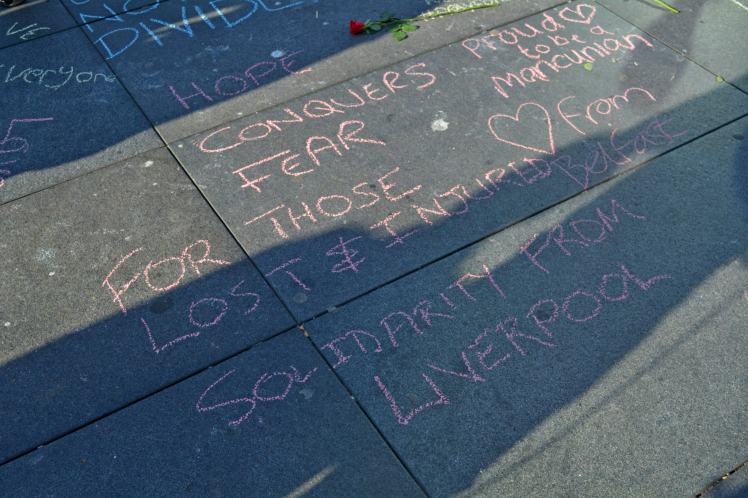
(James O’Hanlon/Flicker)
The response to the recent terrorist attack in Manchester is still unfolding, but it has already served to remind us that, in the Digital Age, responding to tragedy poses new challenges for heads of state and other public figures.
Compared to Tony Walsh reading his poem “This is the Place” at the Manchester vigil and the unscripted authenticity of the crowd breaking into song, the carefully-worded statements of world leaders seem to rattle like empty cans. Perhaps comparing the words of a poet to that of a politician is unfair; when the world expects a statement, and the words of shock, condolence and condemnation are so predictable, “diplomacy of sympathy” inevitably loses its impact. Although language has the power to narrate or interpret national trauma, it seems that providing true comfort or reassurance is a hit-or-miss practice for national leaders. Why, then, is it still so unthinkable that these heads of state could choose to remain silent and forgo releasing a generic message into the social media storm of responses?
Many continue to make the valid observation that our cross-border expressions of sympathy are the most emphatic for Western victims and that acute incidents provoke much more “diplomacy of sympathy” dialogue than deaths in ongoing warzones. But putting this selective blindness aside, this practice is worth examining further. The frequency of “condolences,” “condemnation,” and “solidarity” as buzzwords in official post-attack discourses may be read as the successful communication of a unified message. But increasingly, these messages read like tired scripts that don’t speak to victims’ pain or promise much in terms of a national or multi-lateral response.
Unsurprisingly, the current U.S. president deviated slightly from the diplomatic script in his response to the Manchester attack. Both Trump’s personal and the POTUS accounts tweeted a line from his speech in response to the events, choosing, “We stand in absolute solidarity with the people of the United Kingdom,” thus ticking off key disaster diplomacy language. But in his speech, Trump spent more time labeling the terrorists “evil losers.” This infantile take on violence deserves the same eye-rolling that greeted the president when he instructed supporters committing hate crimes to “stop it,” but it also throws the linguistic line-toeing of other leaders’ statements into sharp relief.
Trump’s departure from convention is also notable in the context of the “democratization” of media that has enabled individuals to engage with official statements on Twitter and other sites. Inappropriate responses can be criticized or ridiculed by other users, even before coverage by mainstream media, with public figures also entering the scrum. The outrage generated when Trump Jr. tweeted about the London Mayor, Sadiq Khan, provides an example of the bizarre turn dialogue between (supposed) state representatives can sometimes take. Trump Jr. quoted Khan out of context, using words from a 2016 interview as if they were a response to the terror incident in Westminster in March of this year. The refusal to fact-check is already a calling card of the Trump administration (and family), but this example also shows how online interactions between individuals affiliated with the government can undermine the diplomacy of sympathy between states.
With national administrations publicly communicating on social media, the global audience consuming news of “disasters” look just as much to celebrities as heads of state for comment. The social media backlash to Kim Kardashian’s tweet about the attack arguably got as much coverage as official statements from world leaders. In fact, the fervor with which Kardashian was criticized for posting a photo of herself at an earlier Ariana Grande concert points us to the consequences of public figures, political or otherwise, veering off-script. Twitter and other social media offer the fastest way for both celebrities and world leaders to respond to global events. But when users are quick to look to the entertainment industry for a response, it is clear that state representatives must pull off their difficult rhetorical balancing act in a quickly evolving and increasingly crowded public forum.
“Grassroots” responses often demonstrate that the repetition of certain words following a tragic event need not always indicate empty, unoriginal platitudes. The sweeping popularity of “Je Suis Charlie” after the January 2015 attack on the Charlie Hebdo offices, for example, allowed for a (not completely uncontroversial) demonstration of grief and solidarity across communication platforms. In comparison, when public figures’ reactions to a disaster seem little more than rearrangements of the same set phrases, they can’t help but ring a little hollow.
Admittedly, there exists a parallel between these stiff condolences and the lack of appropriate language for personal grief or tragedy, but it seems that unrehearsed memorialization seen in vigils or demonstrations provides greater social healing and reassurance than the words of our leaders. What we are left with is a race “to the top” in which state representatives rush to make the strongest condemnation, the most sincere pledge of solidarity and the fiercest vow to fight terrorism—knee-jerk reactions that drain the script of disaster diplomacy of its emotional resonance.